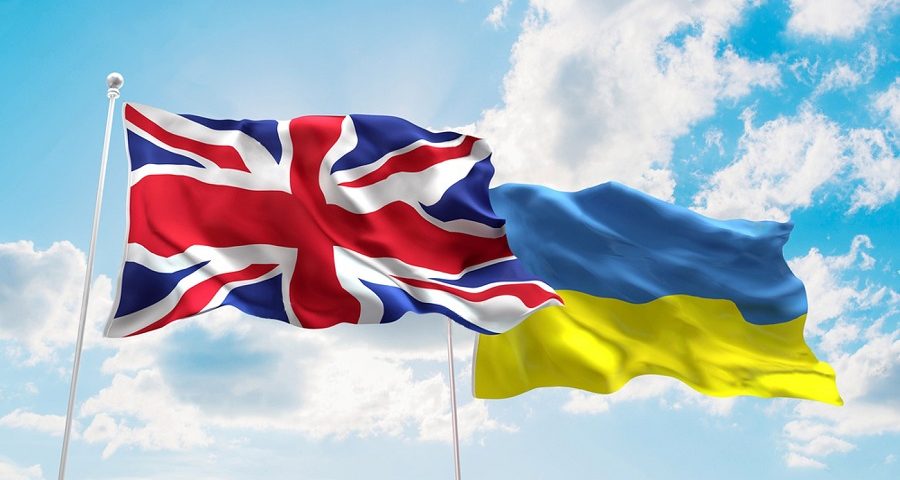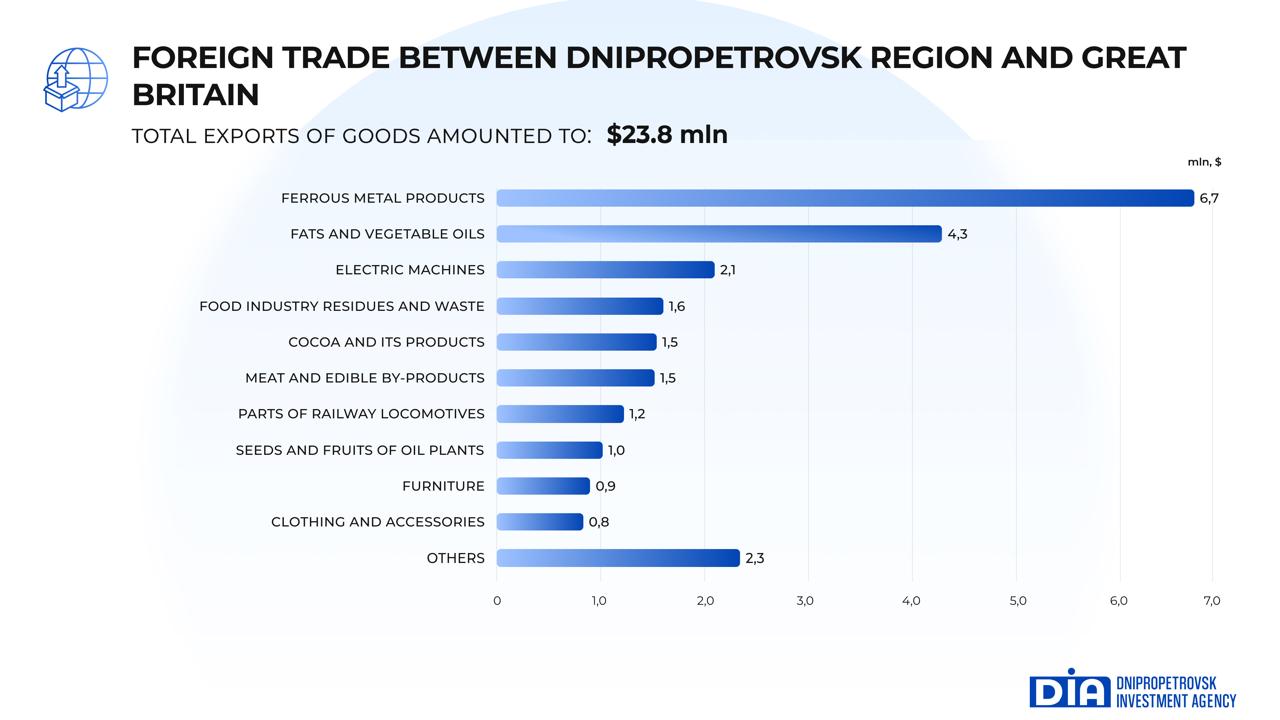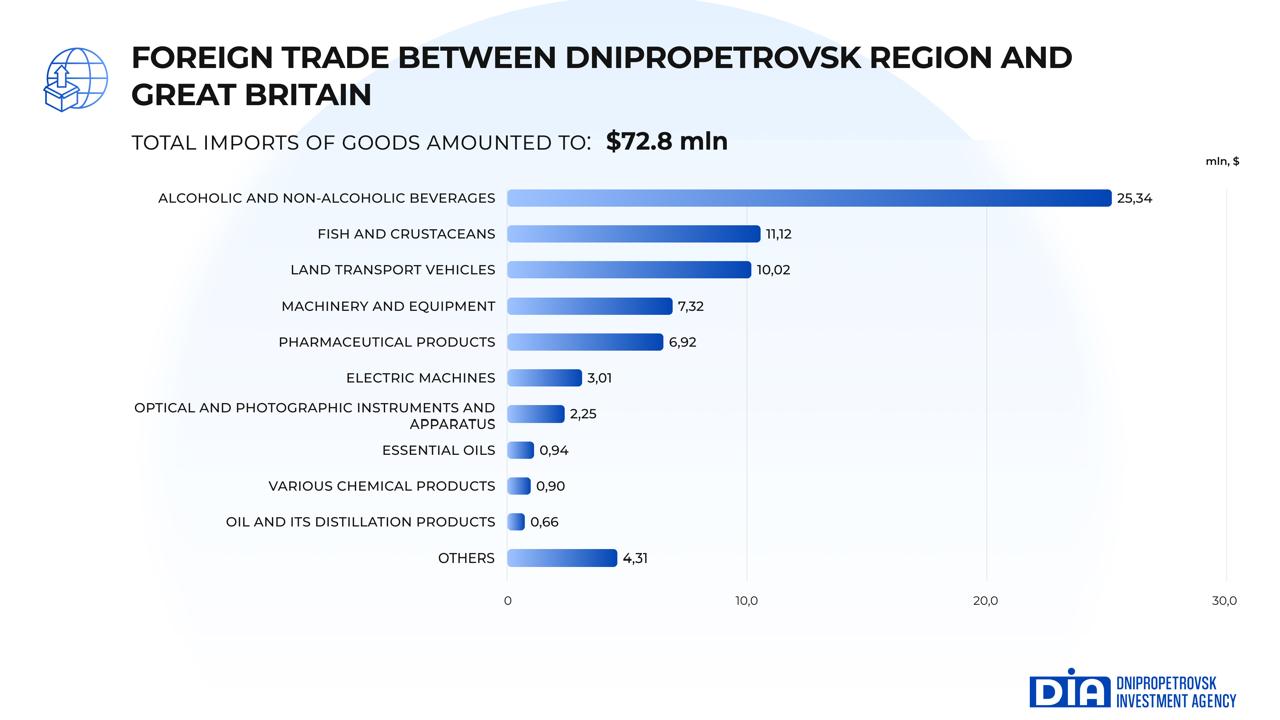Doing business

Dnipropetrovsk Investment Agency keeps introducing about the level of Ukraine and Dnipropetrovsk region cooperation with other countries amid the unprovoked military aggression by the russian federation. For now, we propose an overview of the assistance provided by Great Britain and the foreign trade volume figures, which is derived from DIABASE data.
Since the beginning of the full-scale invasion of Ukraine by the Russian federation in 2022, Great Britain has consistently acted as one of Kyiv’s key international allies. London provides comprehensive support to Ukraine — from military equipment and training of soldiers to financial, humanitarian and diplomatic assistance. In 2025, Britain not only maintained a high level of support, but also strengthened its participation, demonstrating strategic determination in confronting russian military aggression. As of mid-2025, Great Britain has already provided about $23.94 billion in total assistance to Ukraine since 2022, of which $17.1 billion is for military needs.
The United Kingdom is a leader of the multilateral International Fund for Ukraine (IFU) initiative, established in 2022 to provide rapid financing for the procurement of critical weapons for the Armed Forces of Ukraine. The fund unites contributions from more than 10 countries, including Norway, Netherlands, Denmark, Sweden and others, providing Ukraine with modern air defence systems, drones, electronic warfare equipment, armoured vehicles and ammunition. The UK not only coordinates the work of the IFU, but is also one of its main donors, investing hundreds of millions of pounds in purchases through the fund. Due to the IFU, dozens of contracts with defence companies have been implemented, allowing the urgent needs of the Ukrainian army to be met quickly.
In April 2025, Great Britain provided Ukraine with a military aid package worth £450 million ($589 million). Of this amount, 350 million will come from the British government, with further funding provided by Norway (through the London-led International Fund for Ukraine). The package includes £160 million, which will be used to repair and maintain vehicles and equipment previously transferred to Ukraine. This involves a partnership between British companies and Ukrainian industry. The new package also provides for the financing of radar systems, anti-tank mines and hundreds of thousands of drones worth over £250 million. These include highly manoeuvrable FPV drones, which will be purchased from suppliers in Great Britain and Ukraine.
In the summer of 2025, Great Britain transferred a new package of military aid to Ukraine, financed for the first time from interest received on frozen russian assets. As part of this package, Ukraine will receive 350 modern missiles for air defence systems, manufactured in Britain and adapted in record time for ground launch. To this aim, London used £70 million ($95.3 million) received under the ERA initiative.
The total amount of military support from Great Britain in 2025 is £4.5 billion. These funds are intended for the purchase of air defence systems, artillery, spare parts for vehicles and other military equipment.
As part of the Operation Interflex initiative, British instructors, as well as military personnel from other allied countries (including Canada, Denmark, New Zealand, Norway and the Netherlands), continue to conduct basic military training for Ukrainian soldiers in the UK. The training covers tactical training, weapons handling, first aid, engineering, mine and explosive safety, etc. As of 2025, more than 60,000 Ukrainian military personnel have already been trained under this program, which has significantly increased the combat capability of the Armed Forces of Ukraine.
On 2 March 2025, Great Britain was one of the initiators of the creation of the Coalition of the Willing, a group of countries that are ready to provide Ukraine with additional security guarantees, including possible peacekeeping contingents and to coordinate further military and financial support. As part of this initiative, plans are being discussed to create a Multinational Force Ukraine to ensure security in the event of a ceasefire agreement or peace treaty.
Through World Bank loan guarantees, the UK has committed up to $5.5 billion to support Ukraine’s economic stability and the functioning of state institutions. In addition, $1.6 billion in bilateral assistance (in the areas of humanitarian support, energy, rebuild and reform) has been promised for 2025–2026. In the area of humanitarian aid, the UK has allocated over $161 million for the 2024–2025 financial year. Significant funds have also been allocated to restore damaged infrastructure, modernize energy systems and support stabilization programs.
The UK is funding the activities of the international organization HALO Trust in Ukraine, which specializes in demining. In particular, the British government has allocated funds to extend the contract with HALO Trust for 2025–2026. In the humanitarian direction, London also supports the civilian population in frontline areas, financing projects for reconstruction, the supply of basic goods, medicines and other necessary assistance.
Great Britain continues to be an important trading partner for Dnipropetrovsk region. The high level of partnership is evidenced by a bilateral analysis of foreign activities.
British enterprises are most interested in ferrous metal products, fats and vegetable oils, electrical machinery, food products, etc. According to the results of 2024, the volume of exports of goods from Dnipropetrovsk region amounted to $23.8 million and decreased by 3.2% compared to 2023.

More than 50 companies in Dnipropetrovsk region exported their products to the British market, including metallurgical, mechanical engineering, processing and agricultural companies.

Imports of goods from Great Britain to Dnipropetrovsk region increased by almost 50% and amounted to $72.8 million.

On the other hand, 240 import companies in the region bought British goods, like alcoholic and non-alcoholic beverages, fish and crustaceans, land transport vehicles, machinery and equipment, pharmaceutical products, and more.

Import operations were mainly carried out by processing industry enterprises, pharmaceutical and trading companies.
Source: information for the preparation of the article was taken from open online sources